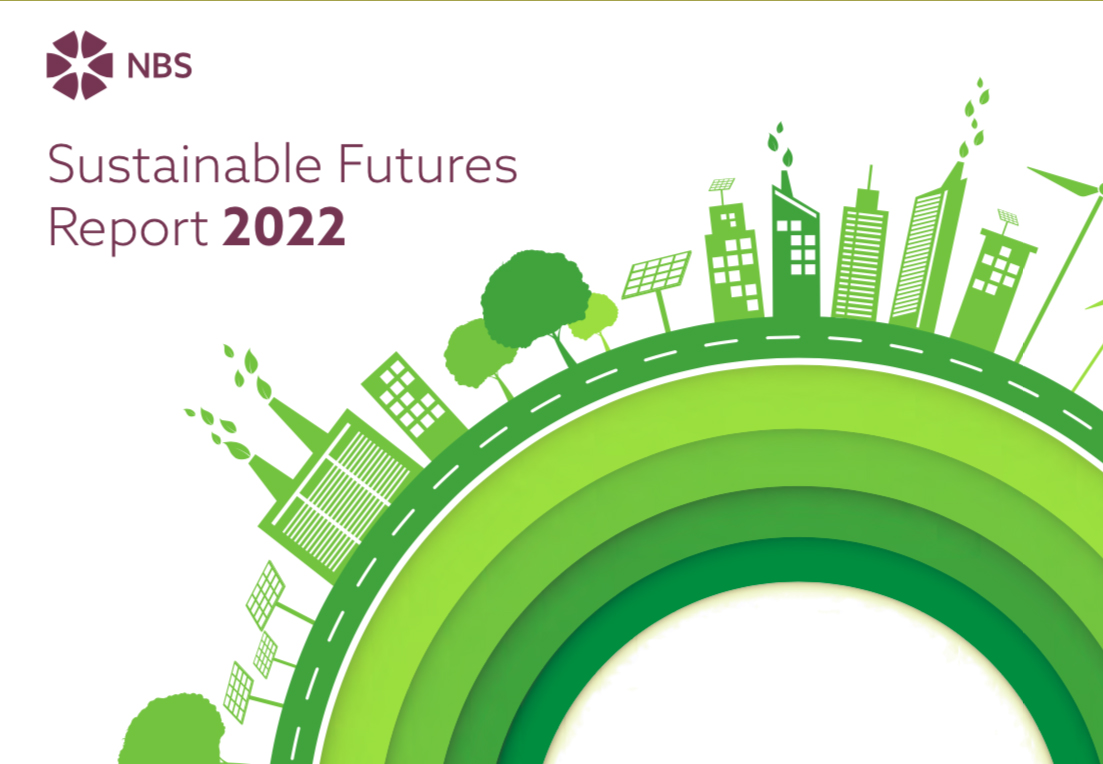NBS sustainable futures report

|
| https://www.thenbs.com/sustainable-futures-report-2022/ |
[edit] NBS sustainability report reveals just a third of projects achieve sustainability goals
The report found that only a third of construction professionals usually manage to achieve delivering sustainable outcomes within a project. The study, which polled 608 construction professionals, found that less people are achieving sustainability targets on projects, compared to those in its 2014 Sustainability Report.
Respondents were also quizzed on the number of projects that had received clear sustainability targets within the past year. 69% had worked on projects where sustainability goals had been included at least some of the time, whilst 25% had seen targets 'most of the time'. However, just 14% had seen targets set on every build.
Just 4% of respondents said they had worked on exclusively net-zero projects and over half (51%) had not worked on a single net-zero project in the past year.
As part of the study, NBS explored some of the barriers to achieving sustainability to find out how standards can be improved. When identifying the main barriers to success, over half stated that a lack of client demand (52%) was the most common cause – just 1% more than the cost of achieving sustainability (51%). Another concern was the view that sustainable products are being 'value engineered' (38%), suggesting cost-cutting measures could rise question marks over quality. 37% also stated the lack of government policy and regulation was another reason for a lack of take up of sustainable practices.
When it came to responsibility and project roles, there were some differences of opinion depending on the audience.
For contractors, contractual risks were a main barrier to achieving sustainability. From a supplier standpoint, the study found they are more likely to view sustainable products as being 'value-engineered'. However, for clients, a lack of management commitment and a lack of sustainable performance information were marked as a major barrier, showing that a further push from project designers and specifiers could increase the chances of sustainability being achieved on a build.
The report also looked at individual responsibility as well as how the subject of sustainability is perceived from within organisations.
Nearly all (97%) respondents said that sustainability is either important or quite important to them personally. 81% of executive/leadership teams placed it as either important or quite important, while the organisations they work for as a whole (85%) revealed a strong appetite for more sustainable outcomes across the board.
Jenny Archer, Senior Research Executive, NBS who led the project, said: "It's been a while since we took a deep dive into the industry's experiences around sustainability and given the recent economic and environmental situation, these results have come at a good time. It's important to get a real understanding of how seriously sustainability is being taken within construction – once we identify the barriers to progress, we can start finding solutions. At NBS, this is our speciality – the findings from this report are extensive and will help us tailor our content to improve knowledge and education around sustainability in the coming months."
Access the full report at: https://www.thenbs.com/sustainable-futures-report-2022/
Based on CIAT article 'NBS sustainability report reveals just a third of projects achieve sustainability goals' April 1 2022.
--CIAT
[edit] Related articles on Designing Buildings
- Active House.
- Aktivplus.
- Biotechnology: The key to zero energy buildings.
- Circular Construction in Regenerative Cities (CIRCuIT).
- Climate change science.
- CRC Energy Efficiency Scheme.
- Earth overshoot day.
- Economic sustainability.
- Emission rates.
- Energy Act.
- Energy Performance Certificates.
- Energy Related Products Regulations.
- Energy targets.
- Environmental impact assessment.
- Environmental legislation.
- Environmental plan.
- Global Real Estate Sustainability Benchmark GRESB.
- Green building.
- Intergovernmental Panel on Climate Change.
- Intergovernmental Panel on Climate Change IPCC.
- Low carbon.
- Mean lean green.
- Passivhaus.
- Reduce, reuse, recycle.
- Regenerative design.
- Scotland publishes plans to reach net zero targets with Heat in Buildings Strategy.
- Sustainable development.
- Sustainable materials.
- Sustainable procurement.
- Sustainable urban drainage systems.
- Sustainability appraisal.
- Sustainability aspirations.
- Sustainability in facility management.
- The Carbon Plan: Delivering our low carbon future.
- UK Climate Change Risk Assessment.
- Zero carbon homes.
- Zero carbon non-domestic buildings.
Featured articles and news
UKCW London to tackle sector’s most pressing issues
AI and skills development, ecology and the environment, policy and planning and more.
Managing building safety risks
Across an existing residential portfolio; a client's perspective.
ECA support for Gate Safe’s Safe School Gates Campaign.
Core construction skills explained
Preparing for a career in construction.
Retrofitting for resilience with the Leicester Resilience Hub
Community-serving facilities, enhanced as support and essential services for climate-related disruptions.
Some of the articles relating to water, here to browse. Any missing?
Recognisable Gothic characters, designed to dramatically spout water away from buildings.
A case study and a warning to would-be developers
Creating four dwellings... after half a century of doing this job, why, oh why, is it so difficult?
Reform of the fire engineering profession
Fire Engineers Advisory Panel: Authoritative Statement, reactions and next steps.
Restoration and renewal of the Palace of Westminster
A complex project of cultural significance from full decant to EMI, opportunities and a potential a way forward.
Apprenticeships and the responsibility we share
Perspectives from the CIOB President as National Apprentice Week comes to a close.
The first line of defence against rain, wind and snow.
Building Safety recap January, 2026
What we missed at the end of last year, and at the start of this...
National Apprenticeship Week 2026, 9-15 Feb
Shining a light on the positive impacts for businesses, their apprentices and the wider economy alike.
Applications and benefits of acoustic flooring
From commercial to retail.
From solid to sprung and ribbed to raised.
Strengthening industry collaboration in Hong Kong
Hong Kong Institute of Construction and The Chartered Institute of Building sign Memorandum of Understanding.
A detailed description from the experts at Cornish Lime.
























